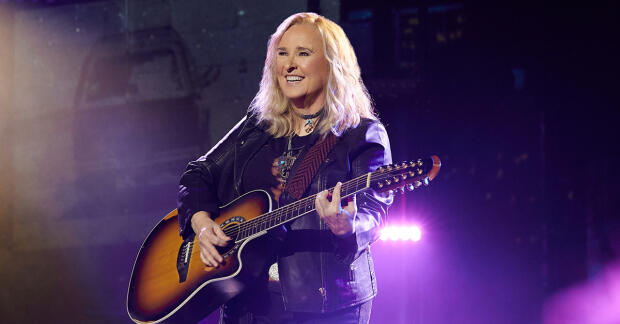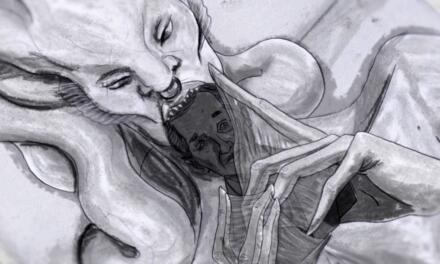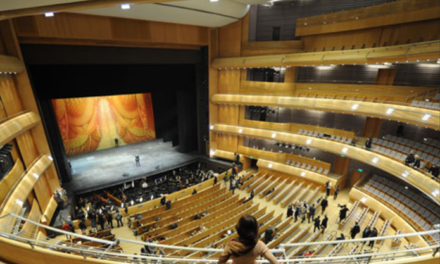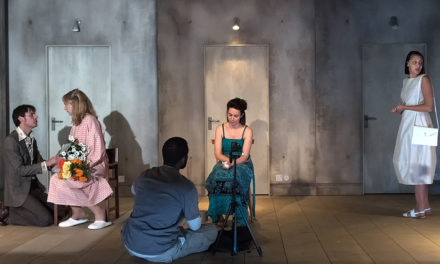I was struggling to find my seat at New World Stages when two people a bit older than me wearing signed, Melissa Etheridge t-shirts, called me over to their row and asked if I needed help. They told me about growing up as queer women with few gay role models until Melissa Etheridge came on the scene. I told them I was only a casual fan, but was grateful that her career had opened up possibilities for so many more queer artists I could see myself in. Then we puzzled over my ticket for a moment until they figured it out and pointed me the right way. This set the tone for the rest of my night at My Window—A Journey Through Life. In this show, and throughout her career, LGBTQ rockstar Melissa Etheridge has facilitated generous, supportive, loving space for queer community.
The first moments of My Window, which is written by Etheridge and her wife, Linda Wallem Etheridge, are an exercise in pure queer ecstasy. The lighting is rainbow (lighting by Abigail Rosen Holmes)! The “crew person” (actually a hilarious Kate Owens playing various bit roles with the masterful physicality of a trained clown) is butch! Etheridge reenacts her birth by emerging from a box yelling “I gotta come out!” (set by Bruce Rodgers)!
Etheridge then settles into an easy groove with stories from every era of her life. From being discouraged from taking up the guitar as a child, to her affair with a woman known only as “the movie star’s wife”, she covers a lot of ground with slick confidence. These stories are of course paired with songs including her hits (“I Want to Come Over”, “I’m the Only One”, “Come to My Window” and others), lesser known material, a few covers, and even the first song she wrote as a child (rich sound design by Colle Bustin). Her gorgeous voice with its trademark rasp won me over immediately and I could feel myself being actively converted from casual fan, to full-blown devotee.
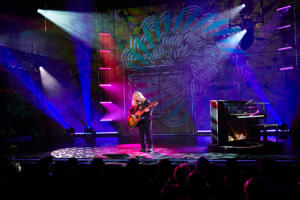
PC: Jenny Anderson.
The night I attended there was a curious, beautiful contrast between her casual demeanor, and her obvious idol status to much of the room. People jumped up after many of her songs, sang along, and yelled out praise and “I love you” like it was a stadium concert. For the many people she means so much to I’m sure each moment of this quite thorough tour through her life is a glorious revelation. As for me, my mind began to drift as the show entered its second, and eventually third hours.
Etheridge is a compelling enough performer that I was never bored exactly, but I did find myself becoming more critical. In the second act she delves into her experiences with cancer saying she believes all physical illnesses have an emotional root, that disease is really just “dis(un)-ease”. I do think it’s important to appreciate the mind/body connection and certainly every person is entitled to navigate their own challenges in the ways that work for them. That said, I am wary of the dynamic formed when Etheridge takes on the tone of an inspirational speaker to tell her adoring fans that she turned down chemotherapy to focus on love. She isn’t advising anyone to follow suit, but I do think it creates a troubling narrative wherein anyone who finds themselves sick or disabled is essentially at fault for not being more positive. Susan Sontag writes about this danger in Illness as Metaphor saying, “Nothing is more punitive than to give a disease a meaning – that meaning being invariably a moralistic one.”
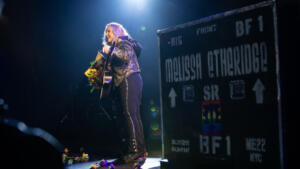
PC: Jenny Anderson.
In talking about her physical, spiritual healing journey Etheridge also discusses turning to Indigenous cultures and ancient healing practices. Admittedly I hadn’t noticed it before, (having, as I do, the privilege not to) but at this point I suddenly realized just how white the audience was. Those of us who are settlers must follow and learn from the Indigenous people who are still and have always been the stewards of the land, (I recommend the books Braiding Sweetgrass by Robin Wall Kimmerer and An Indigenous Peoples’ History of the United States by Roxanne Dunbar-Ortiz as two places to start), but the way Etheridge talks about her Indigenous teachers is culturally non-specific and shallow. She may have a real and deep relationship with the shaman she worked with, but I wished she’d given more context to her position and to the struggles Indigenous people are facing today.
Additionally, for all her talk of love and interconnectivity, at times she comes across as a bit dismissive, seemingly not granting those she has had conflicts with (her sister, her mother, various exes) with the same gentleness and empathy she is working on cultivating towards herself. At some point the stories started to feel one-sided and I wondered how those written off others may describe their relationships to Etheridge.
But I’m sure she has reasons for focusing on what she does. After all, the stakes to her search for meaning and catharsis are high. Towards the end of the show, in near total darkness, she talks about her son’s fatal drug overdose in 2020. It’s a raw and powerful moment of depth for the otherwise mostly joyful show.
But joy or pain, her audience is there for her. At one point Etheridge talked about her first gig at a gay bar saying there was nothing like “the freedom of playing to a gay audience”. I’m so happy she has built a career of doing so because for me, despite any misgivings I had, there was nothing like the freedom of being in a gay audience. I’m grateful to Etheridge for bringing us together to be one for the delight of a show that is My Window.
This post was written by the author in their personal capacity.The opinions expressed in this article are the author’s own and do not reflect the view of The Theatre Times, their staff or collaborators.
This post was written by Morgan Skolnik.
The views expressed here belong to the author and do not necessarily reflect our views and opinions.

